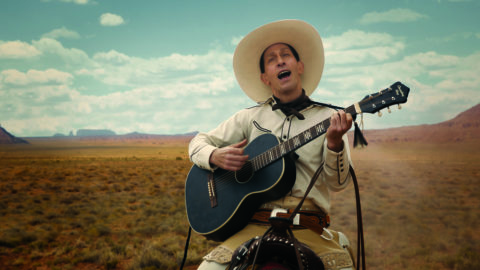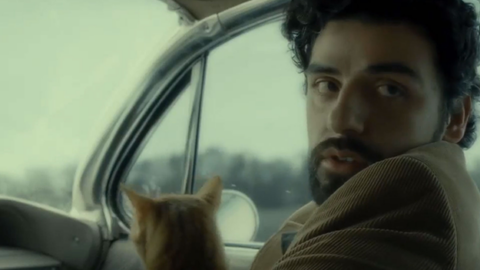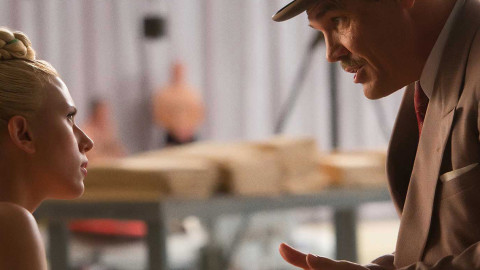Interview: Zoe Kazan
It’s only after four of the film’s stories have come and gone that Zoe Kazan makes her first appearance in Joel and Ethan Coen’s unpredictable Western anthology The Ballad of Buster Scruggs. Kazan’s Alice Longabaugh sits at a crowded boardinghouse dinner table next to her feckless brother Gilbert and listens as he relates his plan to pursue a supposed business prospect out West and, for her, an even more notional marriage interest. Miss Longabaugh seems in fact to spend most of her life enduring things, without the chance or the freedom to acquire the skills or the wherewithal to do much to change her predicament. The wagon train they join is only the latest travail, and Kazan brings a poignancy and delicacy to Miss Longabaugh’s somewhat hopeless but earnestly thoughtful negotiation of the trek, led by the courtly Mr. Knapp (Bill Heck) and old hand Mr. Arthur (Grainger Hines). The name of the story is “The Gal Who Got Rattled,” and that’s as much as I’ll say on the matter.
“I think the movie’s so mysterious, it’s like a dream or something,” Kazan, 35, said in our interview at a Midtown hotel during the 56th New York Film Festival in October. The Ballad of Buster Scruggs—which opens November 9 in select theaters while streaming on Netflix—had its U.S. premiere in the main slate alongside Wildlife, which Kazan co-wrote with partner Paul Dano. Kazan’s comment about dreams (which followed the disarming admission that she had already read Film Comment’s feature on Ballad) led into an analysis of the Coens’ approach that deepened my appreciation for the film and how her own performance works in her story.
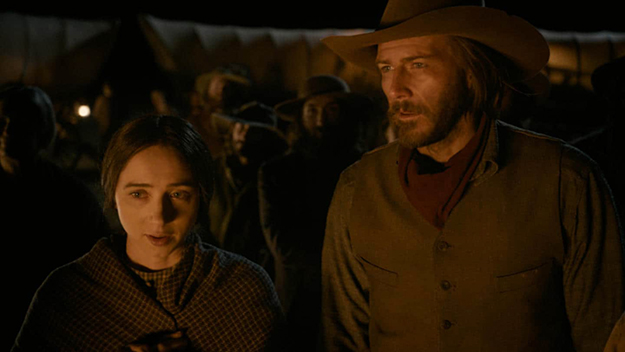
What’s the first Coen Brothers movie you ever saw?
I think it was Raising Arizona, but the first one I really remember seeing and having independent thought about was Fargo. Raising Arizona was one of those my parents got [on video] and thought, “Maybe this isn’t too [risqué] for our kids to also be watching.” Maybe The Hudsucker Proxy was the next one. One of the reasons that the Coen Brothers live in such a pantheon for me is that it’s not what I was raised on. The stuff that my parents were showing to us was older than that for the most part. It was classic Hollywood, like Hitchcock, Preston Sturges, and Billy Wilder. You know, The Awful Truth, Double Indemnity, and things like that. Then Kurosawa and things like that for foreign. So my watching all the Coen Brothers movies really happened with my college boyfriend. I think that, especially for kids raised by other cinephiles, there’s something about the ones that you come to on your own and get to have your own independent adult experience of.
At the NYFF press conference, you said something tantalizing about the stories in Ballad talking to one another. Could you explain how your particular story talks to the other stories?
I think that they prepare you for each other. There’s a kind of dream logic between them—the way that you might have a dream, wake up, fall back to sleep, and somehow it’s a continuation of the same dream but it’s a totally different story. That’s what they feel like to me. Or like entering a room in a museum and you have six Caravaggios on the wall and you think, “Oh, obviously the same painter painted these but here we have six stories.” But I think that with the order they’re in, there’s an internal three-act structure that happens—a three-act structure of expectation. The first one tells you you’re going to have a good time and that death is fun, musical, and funny. You’ll be entertained. Then by the time you get to the third one, it reverses the expectation of the first one—“Oh, you think entertainment is funny? Well, it also has this incredibly high price.” By the time you get to the end of the third one, you’re like, “Oh my protagonist is going to die,” and then you get to the Tom Waits one and your expectation is reversed there and you start to have hope, “Maybe my protagonist won’t always die.” And then the fifth one, “The Gal Who Got Rattled,” the one I’m in, is the longest one, so you have the most time to get to know the characters, and also it’s the most traditional narrative. So, you’re sort of in Brecht’s idea of a digestive theatre: you’re encouraged to sit back and relax a little—and then something happens. The last one [“The Mortal Remains”] allows you to fully slip into the uncanny. I love that last chapter. I think it’s my favorite.
It’s really something. [“The Mortal Remains” consists mostly of a long, eerie carriage ride with a motley crew of passengers.]
It works in this subtle way where it takes a really long time to start to feel like something is not right here. So many of their choices in that one—having these really painted-looking backdrops, the staginess of it—really allow you to go to the unconscious, or to traverse in the uncanny. That’s just what I think, though. That’s not like state-sanctioned.
It’s not Coen-approved?
No, although I did pitch it to Joel on set, and he was like, “That’s smart.” I was like, “All right, I’ll take it.”
How did they describe their idea of your character, Alice Longabaugh?
They didn’t have a deep description. I went in for my audition, they laughed a lot—I didn’t know at the time but on set they laughed when they thought something was good. I knew it was a good sign because they seemed happy, but I didn’t know that’s sort of what they do. I was really familiar with their work, so I understood the tone or performance style of the world that they live in sometimes. But it was really scary to walk into that room and feel like, “I don’t know what they want and I want so badly to be able to give them what they want.” I don’t think I ever talked to them about the character. I feel like a lot of it is in the writing, and then they’ve been working with the same collaborators for so long that they’re an extension of the brothers. Mary Zophres, the costume designer, gave me as much information about what they were thinking as anyone. When I went in for my costume fitting, all of the fabrics were already chosen. The most input that I had was what we did with my hair. But even that was like, “You can have one of these two hairstyles.”
So you picked one.
Yeah, it was like, “to bang or not to bang.” I dunno. I still don’t know what they think of her.
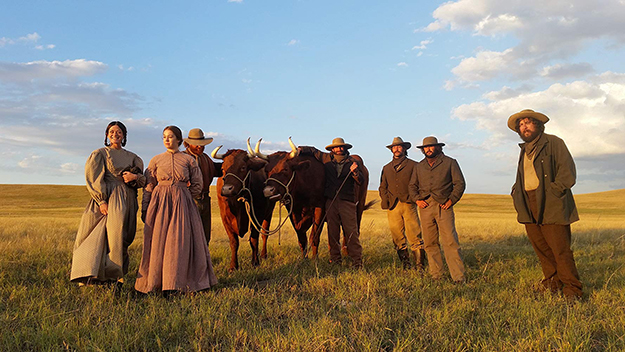
The story is so deeply bleak at a certain level: at one point you say, “I have no people,” when you’re realizing how alone you are in the world, without family. And we understand what that means for a woman of her station in that particular time period. But then the story is also laced with ironies and jokes. I wonder if the Coens’ laughter felt a little jarring.
Well, no, not really, because it read to me a little bit like Chekhov. [Alice Longabaugh] is like Sonia or Masha or something [in The Seagull]. She’s in that realm. I had played those parts before and I knew. As writers, they remind me of Chekhov: in Chekhov, you’ll have someone’s heart breaking and then someone else is telling the world’s most boring story and the other person doesn’t realize that the other person’s heart is breaking. There are humor and tragedy living right on either side of a knife’s edge.
I love Masha’s line in The Seagull, “I’m in mourning for my life.”
Yeah, exactly. [The Coen Brothers] are always bringing their sense of humor to bear, and you can feel it in the writing, even though she’s in a very precarious position throughout most of this story and dealing with the first big decisions of her life. They are also very gently letting us laugh at her but with a lot of love.
From the title “The Gal Who Got Rattled,” it could be like a punchy Western short story in a collection, but when you watch it, it’s not glib.
Yeah, I know. I find their relationship to glibness to be really interesting. You can think that their sense of black humor can look very misanthropic sometimes, and I think Buster Scruggs saying, “The misanthrope, I don’t think I’ve earned that” at the beginning of the film is a little bit of a wink.
Speaking of reflexive or meta moves, I thought “Meal Ticket” with Liam Neeson and Harry Melling was like “the Netflix story” in the film. One medium succeeds another in that story.
I think that there’s a lot about storytelling in these. There’s a kind of framework: these are all about mortality and these are all about storytelling and how stories stave off death. The tagline that they’ve come up with—“Stories live forever, people don’t”—is funny and it’s also what the movie’s about. What I feel in [“Meal Ticket”] is a kind of deep howl and black laughter at what it is to be an artist. People I know who are not in our business who have seen that chapter have found it to be despairingly bleak. It’s one of my favorites. I feel like it’s really true, and I love that it’s almost without dialogue except for his speeches. Harry Melling is so brilliant in it.
As always, I love how grounded the Coens’ writing is in this pure joy in American words. It must be great to have this language that feels so specific—it’s in that time, it’s what your character would have said.
I think you’re right to call to the fore their use of language. It feels unique to me, and in the best way, you really feel the writer’s hand. It’s not naturalistic, it’s one step away from naturalism in almost all of their movies. There’s a sense of style that comes from them, and I think it has to do with how everyone talks differently from each other. It’s a deep sensitivity to language carried all the way through. You know that all of the words that are there were chosen incredibly specifically. Heard like music, like the way that Mozart heard music. And you need to find how to play that music. So the language that Buster Scruggs has is a lot slipperier and the diction is much higher than the diction in ours. The diction in ours is much closer to naturalism, but you know it’s closer to naturalism by choice. Not because they think that’s what good writing is or because that’s the only way that they know how to write. So you’re constantly operating on this other level. Honestly, I have very rarely had that outside of the theater.
Your dialogue with Bill Heck’s wagon train driver, Billy Knapp, is courtly but plain in this wonderful way.
Yeah, it’s really plain.
In a more ideological way, what did you think about playing a character in such an unsentimental depiction? It all takes place in a variation on the mythic world of Westerns, but when it comes right down to it, Alice Longabaugh’s fate is inextricably tied to her gender at that moment.
I think about her as a bird in a cage, and then at the beginning of the story the cage door unexpectedly opens and it’s like she doesn’t know how to step outside and she’s afraid to. Her options are incredibly limited. Not to be fucking depressing but even a hundred years later they’d still be pretty limited. It wasn’t until the early ’70s that women in this country could buy a home or open a line of credit without a man signing for them. So [Alice Longabaugh’s] economic fate is conscribed by her gender. Her vulnerability is conscribed by her gender. She’s deeply afraid of the Other. She’s deeply afraid of what she calls “savages.” I think that’s a stand-in really for her fear of the unknown.
But she has a reason to be afraid. Besides society treating her in a certain way, she also has been in this codependency with her brother who has kept her enslaved to him by putting her down. Her position really spoke to me. I really felt for her. I think it is unsentimental, but I also think there’s something tender in it. Something good happens in the story—bad things happen too—but they find true connection with each other and I think it’s really unexpected. It’s all under the guise of them talking about spirituality and stuff like that. It’s the strangest point of connection. I think there’s some feeling of grace—unexpected grace.
Grace amid this ruthless practicality.
Yeah, totally.
Nicolas Rapold is the editor-in-chief of Film Comment and hosts The Film Comment Podcast.



